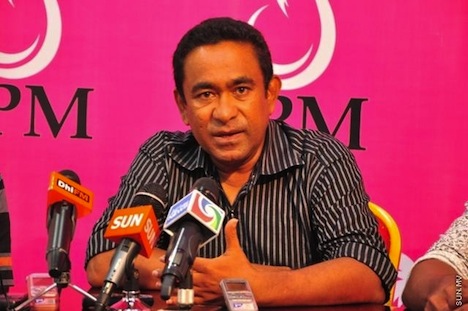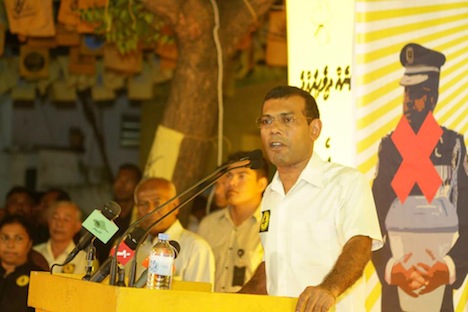
Though the long-delayed presidential election process in the Maldives often seemed in danger of never coming to a completion, today’s Maldivian runoff has apparently selected a new president — five days after the Maldivian constitution required an inauguration and a week after the first round of the rescheduled vote.
Former president Mohammed Nasheed won nearly 47% of the vote in the first round — and around 45.5% in the previous first round held in September (which was subsequently annulled by the Maldivian supreme court).
But last week’s runner-up Abdulla Yameen (pictured above) emerged victorious today in the runoff, boosting his support from around 30% in the first round to 51.39% today. Nasheed won just 48.61%.
Nasheed became the first democratically elected president in Maldivian history when he won the previous 2008 presidential election, though he was pushed out of office in February 2012 following protests over rising prices and a poor economy. Nasheed achieved international fame for the cause of climate change — at an average of around four feet above sea level, the Maldives face destruction from global warming and rising sea levels.
But those concerns were distant from the 2013 election and political crisis. Yameen’s electoral win is a victory for Maumoon Abdul Gayoom, who ruled the Maldives from 1978 to 2008 (Nasheed defeated Gayoom in the 2008 election). Gayoom, however, never fully left the stage of Maldivian politics — Yameen is his half-brother, and many of the Maldivian state institutions, especially its judiciary, are believed to remain more loyal to Gayoom than to the rule of law.
Though the Indian and global media are reporting that Yameen’s victory is somewhat of a surprise, it shouldn’t be. Nasheed failed, however narrowly, to surpass the critical 50% mark in both the annulled September 7 round and in the November 9 round. Moreover, the third-place candidate, Qasim Ibrahim, a former Gayoom-era finance minister, won 23% in the previous vote, and he subsequently endorsed Yameen. It was Ibrahim’s complaint about potential ballot fraud following the first round that led the Maldivian supreme court to annul the September vote, a move that was widely seen as an opportunity for Nasheed’s opponents to unite around Yameen.
It’s clear that after three votes, Nasheed marshals something just short of an absolute majority (45.45%, 46.93%, 48.61%) of the Maldivian electorate. While the process may not have been comically flawed, the votes demonstrate that Nasheed simply failed to build a fully majoritarian coalition for his relatively secular, technocratic, pro-democracy, pro-development vision. It’s important to remember that five years ago, when Nasheed capitalized on three decades of pent-up resentments over the Gayoom regime, he defeated the old authoritarian with just 53.65% of the vote. While Nasheed has conceded defeat in today’s vote, in a move to reinforce respect for the country’s nascent democratic institutions, Gayoom’s resurgence leaves those fragile institutions somewhat in doubt.
Yameen, the candidate of the Progressive Party of Maldives (PPM), a party that Gayoom founded in 2011, campaigned on harsh criminal penalties — including the death penalty. Nasheed had campaigned on a more broadly economic platform of boosting tourism revenues and business development.
Perhaps more fundamentally, Yameen and Ibrahim accused Nasheed and the Maldivian Democratic Party of being too close to the West and too secular in the Muslim country of just 328,000 residents. Nasheed, in turn, argued that Yameen was using religion as a wedge issue to stir resentment and allow for Islamism to take root.





